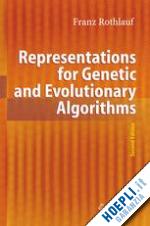
Questo prodotto usufruisce delle SPEDIZIONI GRATIS
selezionando l'opzione Corriere Veloce in fase di ordine.
Pagabile anche con Carta della cultura giovani e del merito, 18App Bonus Cultura e Carta del Docente
In the field of genetic and evolutionary algorithms (GEAs), a large amount of theory and empirical study has been focused on operators and test problems, while problem representation has often been taken as given. This book breaks with this tradition and provides a comprehensive overview on the influence of problem representations on GEA performance. The book summarizes existing knowledge regarding problem representations and describes how basic properties of representations, such as redundancy, scaling, or locality, influence the performance of GEAs and other heuristic optimization methods. Using the developed theory, representations can be analyzed and designed in a theory-guided matter. The theoretical concepts are used for solving integer optimization problems and network design problems more efficiently. The book is written in an easy-readable style and is intended for researchers, practitioners, and students who want to learn about representations. This second edition extends the analysis of the basic properties of representations and introduces a new chapter on the analysis of direct representations.











Il sito utilizza cookie ed altri strumenti di tracciamento che raccolgono informazioni dal dispositivo dell’utente. Oltre ai cookie tecnici ed analitici aggregati, strettamente necessari per il funzionamento di questo sito web, previo consenso dell’utente possono essere installati cookie di profilazione e marketing e cookie dei social media. Cliccando su “Accetto tutti i cookie” saranno attivate tutte le categorie di cookie. Per accettare solo deterninate categorie di cookie, cliccare invece su “Impostazioni cookie”. Chiudendo il banner o continuando a navigare saranno installati solo cookie tecnici. Per maggiori dettagli, consultare la Cookie Policy.